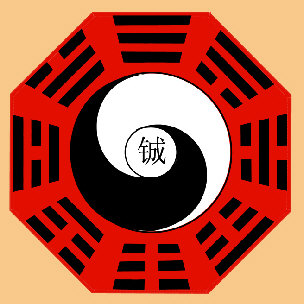
Notes and References
All Material, Unless Otherwise Noted, Copyright Donald Lockwood 2007-
The Sincerity Mandala and its Structure
The Sincerity Mandala is based on the traditional Chinese principles of Creation.
The concept of ch’eng, usually translated as sincerity is fundamental to Chinese
thinking. It can also be rendered as truth, authenticity and genuineness. Tu Wei-
The cosmological aspect of Sincerity emerges clearly in a passage form the Doctrine
of the Mean, “Sincerity is the beginning and end of things. Without sincerity there
can be nothing” (p. 316). In the Sincerity Mandala this cosmological meaning is
combined with the forty-
“The Tao conceives the One.
The One generates the Dyad.
The Dyad gives birth to the Triad.
The Triad to all things.”
(Author’s version)
The Sincerity Mandala also includes the teachings of Mencius, one of the Sages of
the Ru Tao or Confucian Way, who taught; “...sincerity is the Tao of Heaven, and
to be sincere is the Tao of man” (p. 156) It is instructive to substitute the alternative
meanings given above in this quote, thus, “The Way of Heaven is creativity, the Way
of Man is to become creative.” The Sincerity Mandala has the Chinese character for
Sincerity in the center as a representation of the Tao of Heaven as cosmic creativity.
It in turn is within a white circle which represents the One. The One is surrounded
by black and white swirls which represent the Dyad of Yin and Yang, and about this
circle are the eight Gua or Trigrams of the I Ching. These Trigrams are combinations
of two short lines and one long line, taken three ways, thus the two types of lines
taken three at a time give rise to the eight figures whose combinations are the sixty-
Because of the importance of “sincerity”, some further consideration of it might be in order. In the following discussion it is important to remember the various meanings of ch’eng, but the translation cited uses sincerity.
First lets examine “He who possesses sincerity achieves what is right without effort,
understands without thinking, and naturally and easily embodies the Tao. He is indeed
a sage” (p. 315), and further that “(sincerity)... is the way whereby the inner and
outer are united. Hence with sincerity all things are right and proper” (p. 316).
Here sincerity emerges as a root teaching, because it is the easiest way to achieve
the Tao and also the safest, because with sincerity “... all things are right and
proper.” And if they are right and proper, how can anything go wrong? On the importance
of the Tao to one’s life: “Let a man proceed in accordance with the Tao, and, though
dull, he will surely become intelligent; though weak, he will surely become strong.”
This means that a person who cultivates sincerity and follows the Tao will be improved,
thus it is not necessary to be really smart, or superior in any way to follow the
Tao, just reasonably whole, because the Tao is in you now, as you walk and breath
and live, all you need to align yourself with the Tao, which is already within you
and around you all of the time and you will acquire whatever other attributes are
needed for your self-
Teaching that “Sincerity means self-
The person who follows the path of sincerity will be able to become a conscious participant of the cosmos and in so far as it may be for human being to be so, a master of their own life. Thus it says: “It is only the individual possessed of supreme sincerity who can give full development to his nature. Able to give full development to his nature, he can give full development to the nature of all men. Able to give full development to the nature of all men, he can give full development to the nature of things. Able to give full development to the nature of all things, he can assist the transforming and nurturing processes of Heaven and earth. Able to assist the transforming and nurturing processes of Heaven and earth, he may, with Heaven and earth, form a triad.” (p. 316) And also: “Therefore, the individual possessed of supreme sincerity is like a divinity.”
Now the last quote in particular needs some context. First of all “divinity” is not conceived like a Judeo/Christian god and the best Christian rendering would be saint. But fundamentally the point is that a person who cultivates Sincerity as a path can eventually become a conscious participant in the Cosmic process with all rights and privileges, but also duties and responsibilities that are implied by such a status.
Now it should be clear why the Mean says that the self cultivator: “... considers sincerity as the most valuable of all attainments” (p. 316)















